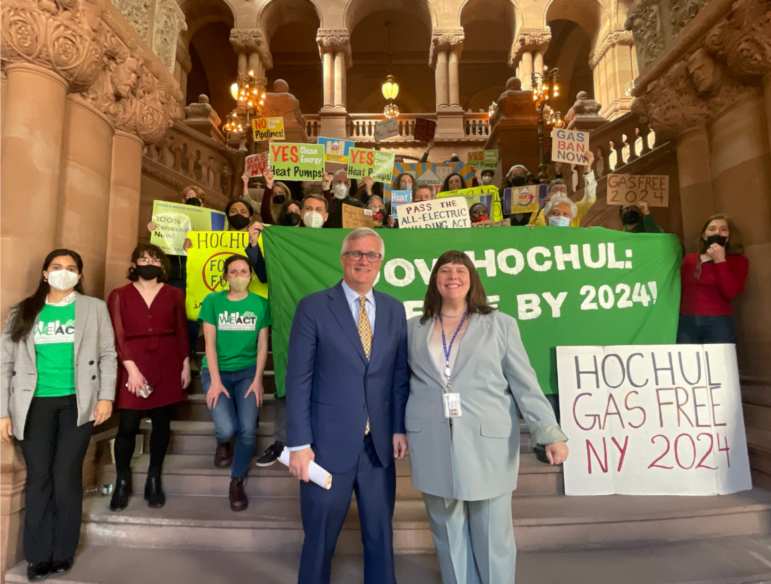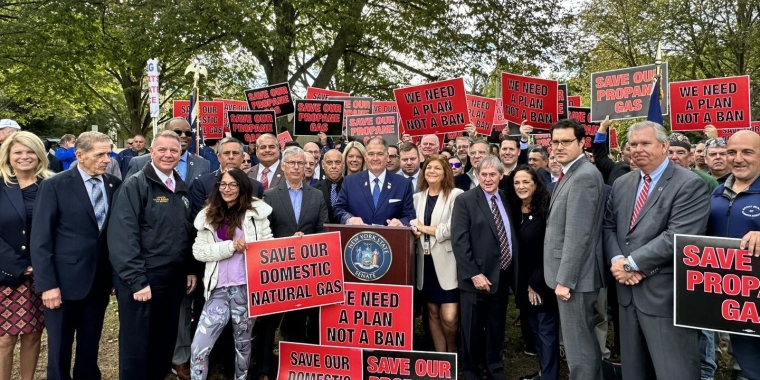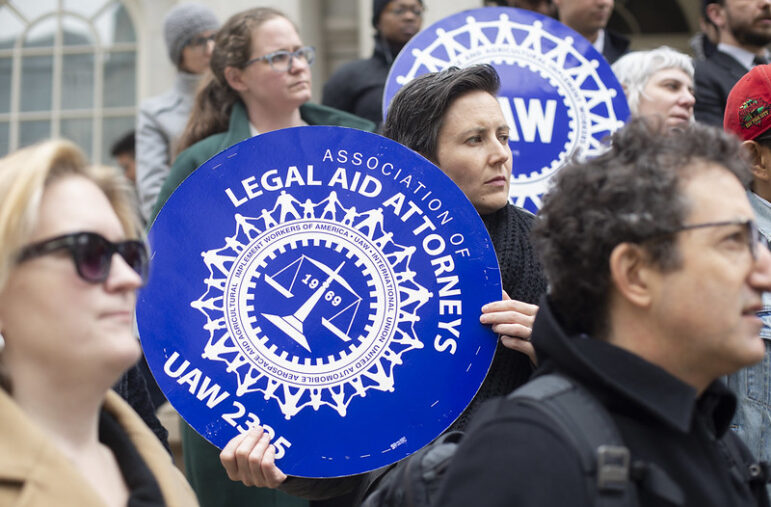After a lawsuit in California toppled the city of Berkeley’s efforts to replace gas stoves with clean electric energy in new buildings, fossil fuel industry groups are testing the same legal strategy in New York.

Adi Talwar
New York’s law prohibiting the use of fossil fuel equipment in new buildings is set to go into effect in 2026 for structures of seven stories or less, and in 2029 for larger buildings.New York is on a mission to power the state with clean electric energy and phase out the use of gas stoves and other polluting fossil fuels from its buildings. The goal, set by the state’s climate law, is to reduce 85 percent of greenhouse gas emissions below 1990 levels by 2050 and have 70 percent of New York’s power come from renewable sources by 2030.
In May, environmentalists felt that target was within reach when New York became the first state in the country to pass a law prohibiting the use of fossil fuel equipment in new construction. The mandate is set to go into effect in 2026 for new buildings of seven stories or less, and in 2029 for larger buildings.
But just four months after the law’s passage, a lawsuit was put in place to block it.
Filed on Oct.12 at the Court for the Northern District of New York, the suit is led by 13 plaintiffs, which include the National Gas and Propane Association and a series of small businesses and unions.
They argue in their complaint that prohibiting the use of gas in new construction violates a federal law that gives the U.S. government authority to set energy-efficiency standards for appliances. State officials are expected to file a response to the initial complaint by Dec. 18.
But this isn’t the first time a similar group of plaintiffs, represented by the self-proclaimed elite law firm Reichman Jorgensen Lehman & Feldberg LLP, filed a suit with the same legal argument.
In California, a similar case at the Ninth Circuit federal appeals court was successful in overturning the city of Berkeley’s ban on natural gas this past spring. Following that decision, another copy-cat suit—which also included the National Gas and Propane Association as a plaintiff—was filed in Washington state, though the case was later withdrawn.
Now, the same legal strategy is being tested in New York.
Court filings reviewed by City Limits and interviews with lawyers, environmentalists, lawmakers and energy experts show an organized effort by fossil fuel groups to use the California case as leverage to challenge other jurisdictions across the nation that want to phase out gas hookups. In the New York suit alone, the Berkeley case is referenced five times.
“[The Berkeley] decision becomes an arrow in their quiver,” said Rob Rains, energy and environmental policy analyst at Washington Analysis, a D.C.-based research firm. “Once you have that one victory, it becomes easy for the gas industry to want to test the limits of that decision in other jurisdictions across the country.”
Last month the National Gas and Propane Association established a fund to allocate up to $2.5 million “to use the court system to challenge illegal anti-energy choice laws,” nationwide.
Environmentalists believe the fossil fuel industry is funding these court battles not only to overturn existing gas bans, but to scare other jurisdictions from going electric.
“These [lawsuits] are part of a concerted effort from the fossil fuel industry to delay the implementation of policies that will get us away from fossil fuels and to continue delaying climate action,” said Liz Moran, a policy advocate at the environmental group Earthjustice.

Assemblymember Gallagher’s office
New York State lawmakers and environmental advocates at a rally in Albany calling for passage of the All-Electric Building Act.West Coast legal battle
Last year, Matt Vespa, a senior attorney at Earthjustice in California, sat down at his desk to sift through financial public records filed by the nation’s largest gas utility company, SoCalGas.
As he scrolled through, it caught his attention that over the last two years, SoCalGas was paying millions of dollars to Reichman Jorgensen Lehman & Feldberg, a self prescribed “elite client-focused national trial firm” that has five offices across the U.S.
In total, SoCalGas paid Reichman Jorgensen over $4.5 million dollars between 2020 and 2022. Of those, at least $2.2 million was paid for using customer money, according to public disclosure records reviewed by City Limits.
“Historically, [Reichman Jorgensen] hadn’t been used by SoCalGas, and all of a sudden they started to pay them fairly significant amounts of money at the same time that a lawsuit was going on in Berkeley to stop the gas ban there. So I thought, well, this is kind of an odd coincidence,” Vespa said.
Reichman Jorgensen was representing the California Restaurant Association in a lawsuit that was filed in late November of 2019, with the purpose of taking down Berkeley’s ban on natural gas. In their complaint, the plaintiff claimed that “restaurants specializing in international foods so prized in the Bay Area will be unable to prepare many of their specialties without natural gas.”
As the lawsuit chugged along, SoCalGas also made over $700,000 in donations to the California Restaurant Association and the affiliated California Restaurant Association Foundation Inc, according to public filings reviewed by City Limits.
SoCalGas said in a document that the money it used to retain Reichman Jorgensen had not funded “legal challenges to local gas bans for new construction” like the Berkeley case. But noted that the money was used for “legal services” related to “government actions potentially affecting natural gas service…such as whether they might be preempted by federal law.”
This response was particularly jarring for Vespa. The California Restaurant Association ended up winning the Berkeley case on the grounds that the local gas ban was “preempted” or blocked by a higher ranking federal law known as the Energy Policy and Conservation Act (EPCA) of 1975.
Three judges concluded that in Berkeley, prohibiting the use of fossil fuels in buildings has an impact on the “quantity of energy directly consumed by” household appliances like hot water heaters and furnaces that are covered by EPCA. And because EPCA is a higher ranking federal law, it “preempts,” or has the ultimate say, over the local law.
“I think that’s a very overbroad argument,” said Amy Turner, director of the Cities Climate Law Initiative at Columbia University.
Lawyers who spoke with City Limits explained that EPCA was created to set a single national energy performance standard for appliance manufacturers so they wouldn’t have to deal with the nuisance of meeting standards set by 50 different states.
But in the Berkeley case, Turner argued, the Ninth Circuit went beyond the law’s practical purpose and interpreted it “too broadly.”
“I don’t think that the Ninth Circuit got it right,” she said, adding that the court is currently considering whether to rehear the Berkeley case.
Following the California decision, the two similar lawsuits filed earlier this year in Washington state and New York also argued that gas bans are preempted by EPCA.
“The EPCA is a longstanding federal law establishing a national energy policy,” a representative for the New York plaintiffs said in an email. “The plaintiffs support New York efforts to combat climate change, but the State’s ban on gas appliances and infrastructure violates the law. We are asking for the ban to be deemed illegal and unenforceable.”
In Washington, the case was ultimately withdrawn after state building officials there voted to delay their mandate to restrict the use of natural gas in new builds. They also approved a motion to revise the building codes to reduce the risk of them being overturned in a legal challenge. These decisions happened shortly after the gas ban was overturned in Berkeley.
Unlike in Berkeley, where SoCalGas did not admit a direct link to the lawsuit, three of the plaintiffs named openly in the Washington case were utility companies: Avista Corporation, Cascade Natural Gas Corporation and Northwest Natural Gas Company.
“The gas utilities are sometimes behind the scenes, propping these things up,” said Jan Hasselman, a senior attorney for Earthjustice in Seattle.* “The coal companies and the oil companies are always seen as the bad guys. But the utilities have gotten off scot-free, and they’re just as bad in my view.”

NYS Senator Mattera’s Office
Mario Mattera, a Republican New York state senator and president of the Plumbers Local Union No. 200 that joined the lawsuit challenging New York’s gas ban, organized a rally against the state policy in October, citing its impact on plumbing jobs.The New York players
While local utility companies have not signed on as plaintiffs in the New York lawsuit, all three cases have overlapping parties. The National Propane Gas Association, for one, appears as a plaintiff in both the Washington and New York suit.
And just like in Berkeley, the law firm Reichman Jorgensen Lehman & Feldberg LLP appears as the main representation, with Sarah Jorgensen, the firm’s founding partner, acting as the lead attorney.
Mario Mattera, a Republican New York state senator and president of the Plumbers Local Union No. 200 that joined the lawsuit challenging New York’s gas ban, told City Limits that he helped Sarah Jorgensen and Maryann McCarthy, a fossil fuel industry lobbyist with the Albany firm Brown & Weinraub, “get plaintiffs” for the case.
“[Maryann McCarthy] worked with Sarah Jorgenson and she really worked hard to get plaintiffs. They’re working together on this,” Mattera said. McCarthy spent a decade as associate director of the American Petroleum Institute in New York. She declined to comment, noting that none of her clients are plaintiffs in the suit.
Bamberger & Vlasto, a public relations firm that is speaking on behalf of Reichman Jorgensen, did not respond to inquiries on the role that the law firm and fossil fuel industry lobbyists had in rounding up plaintiffs.
In addition to the plumbers union, the plaintiffs in the New York lawsuit include two small businesses, Mulhern Gas and Holmes Mechanical, the National Association of Homebuilders and the New York State Builders Association, Northeast Hearth, Patio and Barbecue Association, and six unions.
At the end of October, Mattera hosted a press conference for those backing the legal challenge, and the event turned into a rally when 350 people showed up to support taking down the gas ban, according to the senator. Critics called the ban rushed, saying it would spike energy prices and impact housing construction.
Mattera told City Limits he was compelled to join the effort after he “heard about the lawsuit” in California. He hopes to help local tradesmen who fear losing their jobs to electrification efforts.
“I’ve been a master plumber my whole life and every union or non-union plumbing contractor and their workers will be affected by losing work. It’s already happening,” Mattera said.
And the plumbers aren’t alone.
Josh Holmes, owner of Holmes Mechanical, a gas systems and HVAC contractor in North Bangor, said he joined the lawsuit because a sluggish economy and the phasing out of gas hookups is putting a dent in his business.
“It’s affecting us greatly,” Holmes told City Limits. “The percentage of sales is down by, I’d say at least half of what it normally would be.”
But Vespa, who watched the Berkeley suit unfold firsthand, thinks the fossil fuel industry is using small businesses and unions as the face of its lawsuits as a public relations strategy to ensure its own survival.
“They’re always looking for more sympathetic plaintiffs. They’re not going to put the gas industry as a plaintiff. They have to find someone that looks better to the court,” he said. “SoCalGas was not going to be the ones here in Berkeley. So restaurants, I think, here had a certain appeal.”
“They want to keep selling fossil fuels, and they’ll do anything to keep doing that,” he added. “Oftentimes they are in the shadows and it is extremely challenging to track who is funding these efforts.”
Follow the money
Two weeks after the lawsuit to stop New York’s gas ban was filed, one of its plaintiffs, the National Propane Gas Association (NPGA), announced that it had established a Legal Action Fund to “combat illegal governmental overreach that seeks to eliminate energy choice.”
NPGA says it will invest “$1 million to launch these efforts” and eventually “expand the pool to $2.5 million.” NPGA did not respond to City Limits’ inquiry on whether the Legal Action Fund would be used to pay for the lawsuit in New York.
But at a meeting of the National Propane Gas Association that took place in the spring of 2023, high ranking members of NPGA approved an initial outlay of $25,000 to “financially back” the New York lawsuit, according to internal records obtained by City Limits.
Whether or not NPGA admits funds are being allocated to the New York lawsuit, NPGA has made it clear that it intends to turn to the courts and “devote significant, long-term resources” to fight for “the survival of the propane industry.”
Propane is a fossil fuel formed hundreds of millions of years ago from the remains of tiny sea animals and plants. It is currently used in 50 million American households in stoves, fireplaces, furnaces and to heat the water supply, according to the National Propane Gas Association.
NPGA’s President and CEO Steve Kaminski told LP Gas magazine, a publication that covers the propane industry, that they would resort to “proactively filing lawsuits against numerous entities” to keep the industry alive. He added that while it’s “unfortunate” to have to resort to litigation to defend the fuel, “We’re going to take advantage of that and use it. We’re well positioned for it.”
Kaminski did not respond to requests to speak with City Limits.
And the propane industry is fighting the transition away from gas beyond just the legal front. In January, the New York Times reported that the Propane Education and Research Council (PERC), an organization funded by propane providers across the country, plans to spend $13 million on messaging for TV, print and social media to speak out against electrification efforts.
Since 2021, another anti-electrification campaign propped up by the propane industry called Smarter NY Energy spent anywhere from $94,000 to $116,000 on website banners and emails to persuade New Yorkers against electrification, according to reporting by the news site NY Focus.
One of the campaigns’ most popular ads, which was viewed more than 460 times on YouTube, starts off with a warning: “They are coming for your gas furnaces, oil boilers, wood stoves and gasoline fueled cars.”
The video goes on to call New York’s climate law “the most radical untested plan in the country,” and urges consumers to “tell them: get out of my house.”
“The propane industry has become a leading opponent to building electrification,” said Charlie Spatz, a research manager at the Energy and Policy Institute.
“Instead of figuring out how they can become a solution, or help train their workforce to work on building electrification, they have moved towards delay tactics to raise millions of dollars to use litigation to block desperately needed climate solutions,” he added.
For Spatz, the lawsuit to take down New York’s gas ban is just the tip of the iceberg.
“What we’re seeing in New York is part of a much larger effort by utilities and the propane industry and other companies opposed to building electrification that are putting forward a multi-faceted approach to delay climate policy,” he told City Limits.

Adi Talwar
A gas-fueled boiler.The chilling effect
Rob Rains, of Washington Analysis, believes the New York lawsuit has the potential to create a “chilling effect” or give other jurisdictions “cold feet” about prohibiting gas hookups in their own towns, he said.
“If you’re a local government, in the Pacific Northwest for instance, you may give this a second thought, because you’re saying to yourself: this could get tied up in litigation, it could be fairly costly to defend this policy. You know, it might not be worth it, essentially,” Rains said.
An ordinance banning the use of fossil fuels in newly built low-rise residential buildings in the city of Eugene, Oregon was repealed after an opposition group, reportedly funded by a local utility company, pushed back.
The group, Eugene for Energy Choice, successfully gathered enough signatures to put the question of keeping the ordinance up for a vote in a November election. But before the issue could even make it on the ballot, the gas ban was revoked.
“As soon as the Ninth Circuit decision came down, Eugene, Oregon rolled back a policy to restrict natural gas interconnections just on the threat that the Ninth Circuit had ruled that the Berkeley policy was unlawful,” Rains said. “[They thought,] ‘we could be in the same boat.”
New York Gov. Kathy Hochul, who came out in support of the gas ban in her State of the State address in January, referred questions about the legal challenge it’s now facing to the Department of State, which declined to comment on the pending litigation.
Across the U.S, Republican lawmakers in 20 states have successfully blocked jurisdictions from prohibiting the sale of natural gas by putting forth local preemption legislation.
On the flip side, there are currently 97 jurisdictions in the U.S that have policies that prohibit natural gas and fossil fuels in new constructions, according to the Building Decarbonization Coalition. New York City passed its own ban on new construction gas hookups on the local level in 2021.
Rains believes fossil fuel groups are strategically launching lawsuits to fight these policies “tooth and nail in the lower courts” because they are likely to produce split decisions.
“If you have different opinions in different circuit courts, which is becoming more common, it’s more likely that the Supreme Court would take a look at this and try to provide clarity for the entire judicial system,” Rains explained.
“Given the partisan leanings of the Supreme Court, that is probably a bet that proponents of fossil fuels would want to take.”
To reach the reporter behind this story, contact Mariana@citylimits.org. To reach the editor, contact Jeanmarie@citylimits.org
*This story has been updated to correct a spelling error in Jan Hasselman’s name.









5 thoughts on “Efforts to Block Gas Bans Across the Nation Are Growing. Will it Work in New York?”
Gas stoves, gas heat are cheaper to use than massively expensive electric heat and electric stoves. Keep your miserable hands off of what we do in our private homes/apartments.
100% agree!
m this discussion is the idea of system resiliency. The electric grid is a massive infrastructure and prone to periodic failures (either as a whole, or in sections). This can and does happen frequently with major storms.
Having a non-electric based major appliance that can provide hot food is a huge advantage in a major winter storm. The contribution of gas stoves to carbon/greenhouse emissions is miniscule to the point of zero. The lack of backup/resiliency by not allowing New Yorkers other options than 100% reliance on grid/electric is, however, much more likely to actually harm people and make life unnecessarily miserable.
The same goes for pushing “all electric” cars. Next major storm, would you rather have a car with a tank of gas or a dead battery sitting in your garage, and you trapped in your home until “the grid” goes back on?
Q: How will the electricity to power these new electric stoves be generated?
A: Coal.
Nothing speaks to the insanity of “climate laws” more than the ridiculous banning of natural gas stoves.
This is absolutely ridiculous the government has to leave us ordinary people alone. When people have a choice they choose gas stoves if you have an asthma problem then that is up to you not to use one isn’t it? not to stop everybody else on Earth from using it